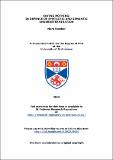Saying nothing : in defence of syntactic and semantic underdetermination
Abstract
According to the Encoding Model, speakers communicate by encoding the propositions they want to communicate into sentences, in accordance with the conventions of a language L. By uttering a sentence that encodes p, the speaker says that p. Communication is successful only if the audience identifies the proposition that the speaker intends to communicate, which is achieved by decoding the uttered sentence in accordance with the conventions of L.
A consequence of the Encoding Model has been the proliferation of underdetermination arguments, each of which concludes against some linguistic theory T, on the grounds that, were T true, audiences would be unable to know what was said by utterances of some particular linguistic form, and therefore unable to know what speakers intended to communicate by these utterance. The result, if we accept the conclusion of these arguments, is radical restriction of the domain of viable linguistic theory.
This Thesis defends an alternative model according to which there need be nothing encoded in an uttered sentence – nothing that is said by its utterance – for the audience to retrieve. Rather, there are indefinitely many ways to interpret uttered sentences – indefinitely many routes to the propositions that speaker intend to communicate – which proceed through different interpretations of what is said.
Type
Thesis, PhD Doctor of Philosophy
Collections
Items in the St Andrews Research Repository are protected by copyright, with all rights reserved, unless otherwise indicated.

